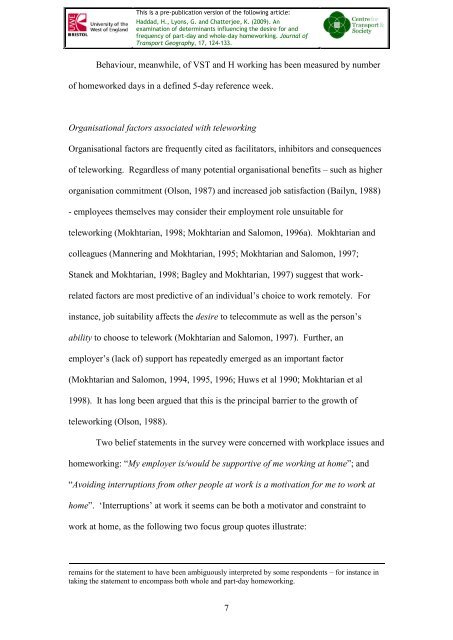Haddad, H. , Lyons, G. and Chatterjee, K. (2009) - UWE Research ...
Haddad, H. , Lyons, G. and Chatterjee, K. (2009) - UWE Research ...
Haddad, H. , Lyons, G. and Chatterjee, K. (2009) - UWE Research ...
You also want an ePaper? Increase the reach of your titles
YUMPU automatically turns print PDFs into web optimized ePapers that Google loves.
This is a pre-publication version of the following article:<br />
<strong>Haddad</strong>, H., <strong>Lyons</strong>, G. <strong>and</strong> <strong>Chatterjee</strong>, K. (<strong>2009</strong>). An<br />
examination of determinants influencing the desire for <strong>and</strong><br />
frequency of part-day <strong>and</strong> whole-day homeworking. Journal of<br />
Transport Geography, 17, 124-133.<br />
Behaviour, meanwhile, of VST <strong>and</strong> H working has been measured by number<br />
of homeworked days in a defined 5-day reference week.<br />
Organisational factors associated with teleworking<br />
Organisational factors are frequently cited as facilitators, inhibitors <strong>and</strong> consequences<br />
of teleworking. Regardless of many potential organisational benefits – such as higher<br />
organisation commitment (Olson, 1987) <strong>and</strong> increased job satisfaction (Bailyn, 1988)<br />
- employees themselves may consider their employment role unsuitable for<br />
teleworking (Mokhtarian, 1998; Mokhtarian <strong>and</strong> Salomon, 1996a). Mokhtarian <strong>and</strong><br />
colleagues (Mannering <strong>and</strong> Mokhtarian, 1995; Mokhtarian <strong>and</strong> Salomon, 1997;<br />
Stanek <strong>and</strong> Mokhtarian, 1998; Bagley <strong>and</strong> Mokhtarian, 1997) suggest that work-<br />
related factors are most predictive of an individual‟s choice to work remotely. For<br />
instance, job suitability affects the desire to telecommute as well as the person‟s<br />
ability to choose to telework (Mokhtarian <strong>and</strong> Salomon, 1997). Further, an<br />
employer‟s (lack of) support has repeatedly emerged as an important factor<br />
(Mokhtarian <strong>and</strong> Salomon, 1994, 1995, 1996; Huws et al 1990; Mokhtarian et al<br />
1998). It has long been argued that this is the principal barrier to the growth of<br />
teleworking (Olson, 1988).<br />
Two belief statements in the survey were concerned with workplace issues <strong>and</strong><br />
homeworking: “My employer is/would be supportive of me working at home”; <strong>and</strong><br />
“Avoiding interruptions from other people at work is a motivation for me to work at<br />
home”. „Interruptions‟ at work it seems can be both a motivator <strong>and</strong> constraint to<br />
work at home, as the following two focus group quotes illustrate:<br />
remains for the statement to have been ambiguously interpreted by some respondents – for instance in<br />
taking the statement to encompass both whole <strong>and</strong> part-day homeworking.<br />
7

















